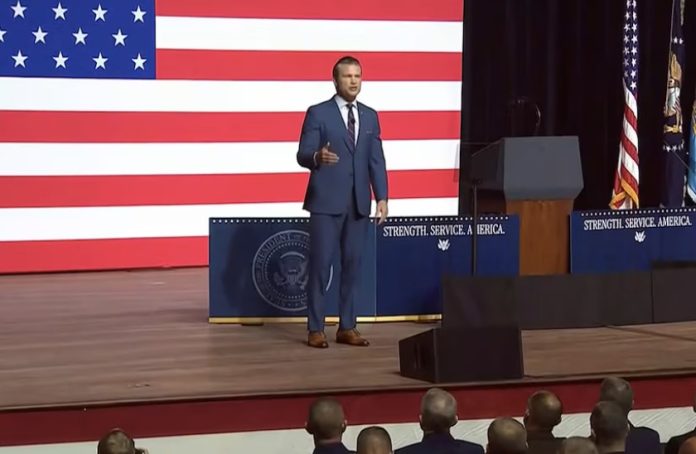Secretary of War Pete Hegseth delivered a blunt message to the U.S. military’s top brass Tuesday, telling senior officers that the days of overweight leaders and out-of-shape servicemembers must come to an end. “Frankly, it’s tiring to look out at combat formations, or really any formation, and see fat troops,” he said. “Likewise, it’s completely unacceptable to see fat generals and admirals in the halls of the Pentagon leading commands around the country and the world.”
At a packed auditorium in Quantico, Va., Secretary of War Pete Hegseth told the Joint Chiefs and senior commanders that personal fitness is crucial for military readiness. He made clear he does not want to see “fat generals and admirals” in leadership, stressing that physical fitness and discipline reflect the military’s overall strength and credibility.
“The American people expect their military leaders to embody excellence,” Hegseth said, according to people present in the room. “That means being physically fit, mentally sharp, and ready at all times. We cannot allow excuses or a lowering of standards.”
A Longstanding Concern
Military fitness has been a long-time concern for defense leaders. The Pentagon reports that over 75 percent of young Americans are unfit for service, with obesity being one of the top reasons for disqualification. For years, commanders have struggled to balance recruitment challenges with the need to uphold strict physical fitness standards.
Hegseth, a former Army officer and combat veteran, signaled that the Pentagon under his watch will take a stricter approach. His remarks suggest a possible tightening of enforcement around body composition standards, physical training programs, and accountability for leaders who fail to set the example.
“It’s a bad look. It is bad, and it’s not who we are,” he continued.
Raising the Standard for Leaders
Directing his comments at the senior-most officers, Hegseth made clear that he sees fitness as a matter of leadership credibility.
“I don’t want my son serving alongside troops who are out of shape, or in a combat unit with females who can’t meet the same combat arms physical standards as men, or troops who are not fully proficient on their assigned weapons, platform, or task, or under a leader who was the first but not the best,” Hegseth said. “Standards must be uniform, gender-neutral, and high.”
Defense officials said no immediate policy changes were announced, but they expect follow-up guidance from the Pentagon in the coming weeks. Potential moves could include revised body-fat assessments, stricter weigh-ins, and expanded fitness training initiatives across the services.
Pushback and Debate Likely
The remarks are likely to spark debate within the ranks. Critics of strict weight standards argue that body mass index (BMI) and tape-measure methods are outdated, sometimes penalizing muscular troops while failing to account for broader measures of health. Others note that decades of combat deployments and aging in service can take a physical toll on career military personnel, especially senior officers.
Still, Hegseth appeared unapologetic in pushing for a cultural reset. “This is about discipline, readiness, and the image we project to the world,” he told the group.
With his pointed call-out of “fat generals and admirals,” the defense secretary seems intent on putting the spotlight squarely on military fitness — beginning at the top. From changing the name of the agency to the U.S. Department of War to reinstating unvaccinated military personnel, Secretary Hegseth has brought significant changes.
“Today, at my direction, every member of the joint force, at every rank, is required to take a PT test twice a year, as well as meet height and weight requirements twice a year, every year of service,” he said.



